Jitka Jiřičková • foto: René Volfík, M. Slussareff personal archive, Shutterstock • 1 April 2020
Home office with children: not easy and not a “vacation”
The closure of schools and kindergartens, restricted movement in public and a shift to working from home (or home office) has created a new species: Homo Domesticus.
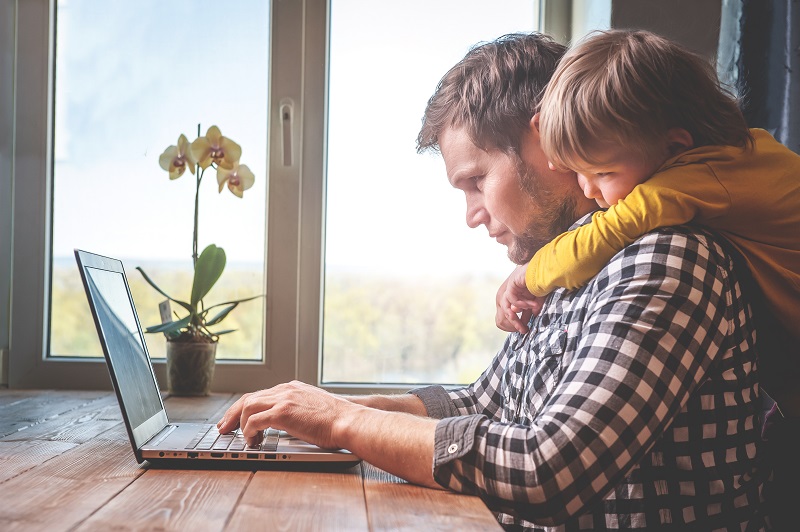
Within the few square metres, the members of this species now work, teach, learn, play, as well as yell, cry, and run the household, often at the same time or in quick succession. Finding a second of lost time or stealing at least a little space and a brief moment for themselves is almost impossible, especially for parents of pre-school or primary school children; to put it mildly, this is a challenge.
Educators of Charles University are no exception. How do they manage to run their households, teach their students at a distance and their children at home, while maintaining a creative mind and good health?
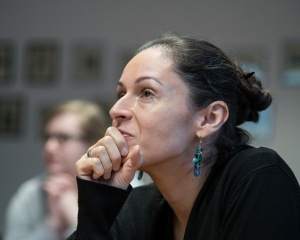
Jana Kalbáčová Vejpravová
Jana Kalbáčová Vejpravová, who teaches and runs several research projects at the Department of Condensed Matter Physics at the Faculty of Mathematics and Physics of Charles University, puts it bluntly: “Working from home with a child around is a utopia,” and adds: “As I have been continuously preparing the materials for the lectures, I am now able to send them to the students and I also add test questions to check if they have understood the topic. Besides, I have to take care of a small child and a household, so the idea of recording two two-hour lectures a week and sharing them on the cloud is unrealistic at the moment.” As for her scientific activities, they had to be suspended completely for the time being.
“I sort of knew this was bound to happen because I have a lot of collaborators in Italy, where universities had to close earlier. Theoretically, we could work individually in our laboratories even now, but I do not want to risk the health or even the lives of my colleagues. Those without children can write articles or process data from home; those with children apologised for not being able to do even that. I too am on a partial leave and am considering sending an application to suspend the ERC project,” adds Kalbáčová Vejpravová.
It’s a two-player game
Perhaps the most effective way to avoid going bananas at home and carry out as many work as possible is to divide the time of babysitting between the two partners if possible (e.g. if they both work from home). Especially fathers should accept that in the current situation, working from home really does not mean moving their offices to the living room for eight hours and enjoying “free meals” cooked by their wives. “It sometimes involves a really assertive approach. This is no day-or-two situation, so a compromise is necessary,” agrees Irena Smetáčková, the head of the Department of Psychology at the Faculty of Education at Charles University. “On the other hand, it can be a great opportunity to learn more about each other’s work and even set up a different relationship for the future and move it to higher levels.”
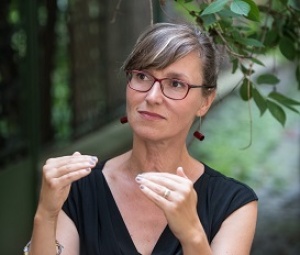
Irena Smetáčková
She took refuge at the family cottage several weeks ago, together with her husband, their four-year-old son, and grandmother. “Mornings are reserved for my share of work, while the husband has the afternoons. Grandma also helps us with babysitting. During the day I have to deal with urgent phone calls and mails from the department. Otherwise, we try to be out in the garden as much as possible, we go for walks in the forest. At eight o’clock, when my son falls asleep, I go to work again. The pile of tasks from the department, from my teaching and research projects is huge,” Smetáčková describes her daily routine. To maintain the physical and mental health of all family members, it is necessary to set the rules and schedule of the day. It is not necessary to stick to exact minutes, but it is vital to make sure that all activities planned actually take turns during the day.
Uncharted territory
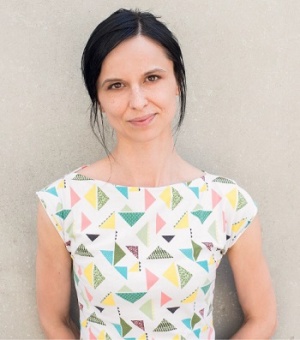
Michaela SlussareffJust about everyone these days has experienced the feeling of anxiety and remorse that work piles up and we are still forced to postpone dealing with it because of children and households or, on the other hand, that we chain ourselves to the computer and let all hell break loose behind our study door. “It took me by surprise when I realized how difficult I find it to concentrate now,” admits Michaela Slussareff of the Institute of Information Studies and Librarianship at Charles University, where she teaches media theory and technologies in education. “I tend to switch constantly to the news, I’m less able to concentrate and am stressed. I manage to tackle the necessary minimum, such as the preparation of teaching materials for students or I am able to complete the work in progress, but I find it difficult to start something new. I totally lack creativity and ideas,” she says openly.
No time for perfectionism
Slussareff’s colleague from the Pedagogical Faculty of Charles University, Hana Sotáková, says that for her, it is necessary to set realistic goals and give up the idea that, as a mother of two schoolchildren, she will manage as much as she would if the university was operating at standard mode. “I try to work as much as I can as I have a responsibility towards my students. I want to provide them with as much input as they need to take from my courses because it is essential for their further study and future practice. But the priorities are now different, it’s no time for perfectionism. If my students fail to submit their assignments by the deadline and are in default just in terms of days, I make no fuss about it. They may have shopped for their grandparents or otherwise volunteered,” explains Sotáková.
She, too, has an established something of a home regime: she wakes up her kids in the morning with the nursery rhyme ‘Wake up you fool, it’s time for school!’ After lunch, when the children have finished their lessons, she has two hours reserved for her work.
“I’ve been home with them since their grammar school closed. In the beginning they took it as a vacation and fun, but as time went by and new stuff was added which would otherwise be explained to them at school but now they had to deal with it on their own or with their mother’s help only, their excitement has declined significantly. Moreover, they miss their friends greatly,” says Sotáková.
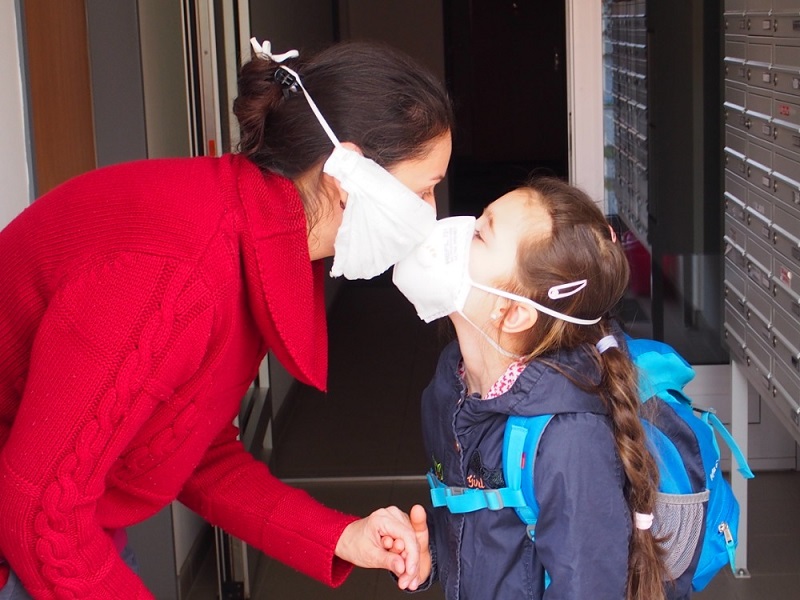
Jana Kalbáčová Vejpravová with her daughter
Repetition and consistency
It is equally as difficult for children to find their bearing in the situation and it is necessary to explain even to the youngest of them why we suddenly insist on adhering to completely new rules. Only consistency, constant repetition and the role model of parents work with the younger ones. The problem is more often in the head of adults who also do not like the covered face and tend to compromise with the child. “However, we know from the cases of physically or mentally challenged children that they get used to the masks and other restrictive aids within a few days if they are presented with clearly defined rules and regime,” Sotáková points out.
Get a life
On the other hand, one should take things that are not life-threatening easy and not waste precious energy on them. Multi-member families cope with this better. For example, in the family of the historian Michal Stehlík, father of eight, who works at the Faculty of Arts at Charles University and in management at the National Museum, there have been no dramatic changes, although his wife now works as an interpreter at video conferences more frequently than ever before.
“She can hardly choose the times or do her work at night, so sometimes the older children have to take care of the youngest ones, who are a year and two years old,” explains Stehlík. In the morning, the schoolchildren are assigned their tasks, with a bit of interference from our four-year-old, who cannot now go to kindergarten. “It may sound harsh, but with so many children, you need to have a long-term logistics plan, a solid regime, and clearly distributed tasks. The children are used to taking into account the needs of other people, I prepare lunches for the next day, and I usually wear headphones which enables me to work “on the go”. There is, however, one substantial change: they had to give up family trips. “Being a ten-people strong family, we exceed the limit and other people could report us for ‘gathering over the limits’,” laughs Stehlík.
Reducing anxiety
The psychologist Markéta Niederlová managed to “keep calm and carry on” when she realised that she already experienced a similar situation; in fact, about every parent did: “I remembered when my children had chickenpox and we found ourselves stranded home for six weeks. Maybe it was even more difficult for me at that time because the kids were much younger and really sick. And I managed it nonetheless,” she says.
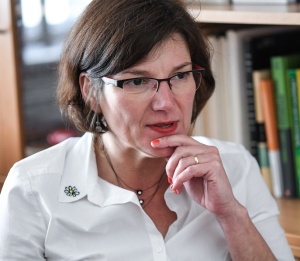
Markéta Niederlová
Now she is trying not to judge but rather observe and think about what she can do here and now. “Short-term stress is not bad, some people can only work under pressure. Anything people do actively is better than wait passively for what may happen be it volunteering for others or buying supplies for themselves. Whatever you do gives you the feeling that you have things under control, that you can influence them,” Niederlová sums up. The biggest stress factor is uncertainty. Perhaps the only solution is to take the measures necessary for survival, focus on things that make us happy, try to change what we can, and disregard the rest. Whether it concerns family communication, moods in society, or careers.
Weathering the crisis, new outlooks
The current crisis can be compared to a five-stage process of coping with deep sadness, for example, after a family disaster: from denial (nothing is going on), anger (why do I have to keep stupid rules?), haggling (when I do this it will settle it) depression (it is not worth an effort anyway) to accepting (it just happened but everything will be okay). Anyone can find their place on this line at the moment. Individual sections, however, have various lengths, can blend and swap the order. Jana Kalbáčová Vejpravová has come to the very end. “I am expecting and accepting that grant support will be reduced next year due to a general lack of funding, but maybe this will prove a change for the better. Until now, I have been going full throttle. Having one smaller project and more time for students doesn’t sound bad at all,” the physicist says.
Additional editing in English by Jan Velinger
